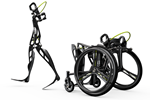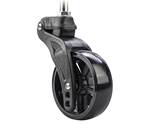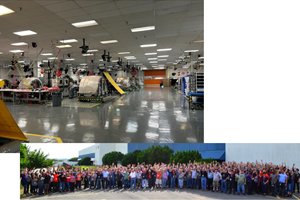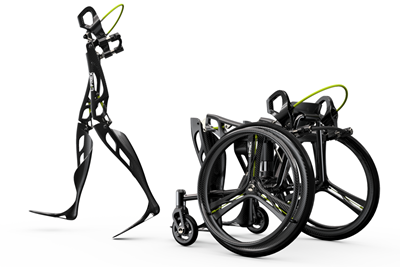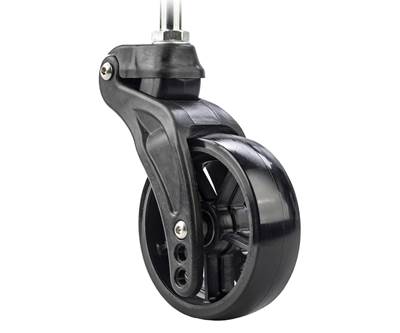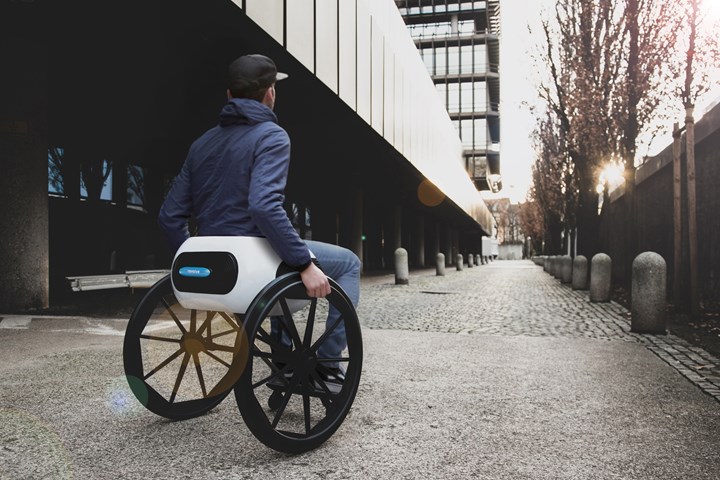
All photo credit: Revolve-wheel
There are numerous wheelchair options available to users, from powered to manual, foldable and rigid, all of which also target a variety of everyday obstacles. But when it comes to public transportation and the space restrictions involved — whether in an airplane, train or via a compact car — even regular mobility for active wheelchair users can get tricky. For example, particularly for airports, wheelchair users often need assistance — which frequently has to be booked in advance to travel — for checking in a wheelchair, boarding the plane, breaking down and removing the wheelchair to the cargo hold, and to ensure its return to its owner upon arrival, all of which creates more waiting time and additional costs. Further, airline negligence damages thousands of wheelchairs each year.
Committed to more functional, high-performance wheelchair mobility, Revolve-wheel (Munich, Germany) founder Andrea Mocellin took his Master degree in vehicle design, and his experiences with companies like Audi AG, GM forum and Lilium, and created a revolutionary approach to wheelchair design, with the patented, foldable Revolve Air. Originally invented, designed and produced in Mocellin’s 37-square-meter studio in Munich, Germany, Revolve Air is said to reduce the amount of time and effort it takes for wheelchair users to travel in space-confined transportation environments.
Revolve-wheel has established a partnership with high-performance engineering and composite material specialist DEXET Technologies (London, U.K.) to turn Mocellin’s initial designs and prototypes into a full-scale finished product. DEXET will apply its composite materials and manufacturing know-how, and its background in Formula One racing and high-performance automotive projects, to help Revolve-wheel develop a lighter, stronger and nimbler wheelchair.
“When we first started talking to Andrea [Mocellin], we were not only in awe of his commitment to mobility and enabling a new era of high-performance wheelchairs, but also his confidence in us,” says DEXET Technologies’ founder and CEO Francesco Aglietti, about the technical partnership. “Andrea came to us to transform his prototype into a product that needed to be lightweight yet strong, had a quality feel, but was also sustainable and built to last.”
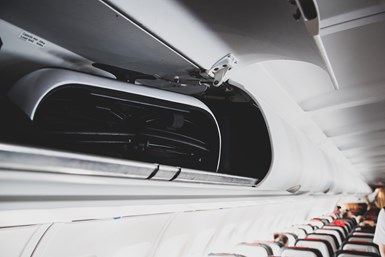
Revolve-wheel says Revolve Air is the first active wheelchair — a wheelchair that enables users to move around on their own, typically offering larger wheels, a lower backrest and lighter weight compared to manual ones — that, when folded into a compact enough shape, fits into a standard universal cabin luggage space. The design takes up 60% less volumetric space when both wheels and frame are folded for easy storage in a small trunk, the passenger seat of a compact car or the overhead baggage hold on an airplane. Also, because it can be easily folded and handled, the Revolve Air can save up to three hours during a one-way airplane trip, helping ease the user through flight check-in, security and other processes, as well as potentially reducing the need for paid assistance. Revolve-wheel also hopes that the Revolve Air will be the first active wheelchair certified as carry-on luggage for national and international flights.
Aglietti says the goals is to first promote Revolve Air as a limited-run series, with no more than 50 high-quality wheelchairs developed for very demanding customers. This low-volume production series will be manufactured using standard prepreg materials — reinforcement and resin system to be used are still under evaluation — and autoclave cure. DEXET Technologies also will experiment with “out of fridge” materials, as well as nano-based materials.
This limited-run series also will help Revolve-wheel optimize the design used for high-volume manufacture of Revolve Air, which will still incorporate composites. Potential suppliers in Europe and the U.K. for both low- and high-volume series are still being considered, and Revolve-wheel and DEXET hope to join forces with individuals, companies and associations that share a passion for improving mobility as much as they do. Prototype production for the limited run is expected to begin toward the end of 2021 for internal testing and development.
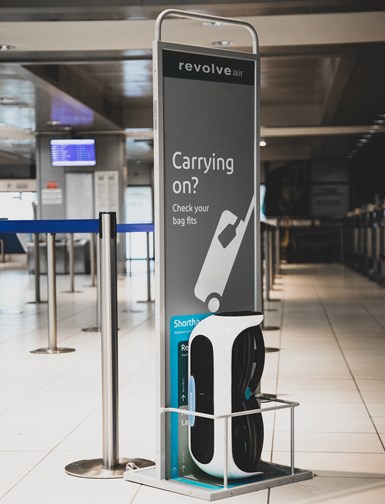
Revolve Air has the potential to be made available as a rental service for airport travelers.
“At the heart of any project is a team,” Andrea Mocellin, Revolve-wheel founder says. “I’ve worked by myself on this, supported by Matteo Mocellin for the media side along the way, but never with a formal partnership. Now we know that there’s a strong customer base behind us that wants a high-performance, functional and sustainable wheelchair. We are able to take it to the next stage. I knew DEXET was the company I should call and the perfect partner to create the production version our clients will rely on every day.”
Looking ahead, Mocellin and Aglietti believe the high-performance wheelchair will provide users a new level of independence when it comes to traveling or commuting in space-confined environments. Further, the project is expected to continue to benefit from the advantages composites convey.
“The future looks very promising for composite materials, but so far the technology is only reserved for high-performance and high-cost products. As a team, we’re excited to use our knowledge not just for Formula One and hypercar projects, but also for the development of products within industries that are generally considered to be more traditional,” says DEXET Technologies’ CFO Leone Benetton. “This is where I think the future lies for composite material applications. With Revolve-wheel, we are committed to bringing advancements to mobility for all people, regardless of whether they’re able bodied or not.”
Related Content
Plant tour: Airbus, Illescas, Spain
Airbus’ Illescas facility, featuring highly automated composites processes for the A350 lower wing cover and one-piece Section 19 fuselage barrels, works toward production ramp-ups and next-generation aircraft.
Read MorePrepreg compression molding supports higher-rate propeller manufacturing
To meet increasing UAV market demands, Mejzlik Propellers has added a higher-rate compression molding line to its custom CFRP propeller capabilities.
Read MoreReducing accidental separator inclusion in prepreg layup
ST Engineering MRAS discusses the importance of addressing human factors to reduce separator inclusion in bonded structures.
Read MoreTCR Composites introduces TR1116 snap-cure epoxy prepreg resin system
Designed for press-cure applications, the resin system is highlighted for its snap-cure capability and tailored properties.
Read MoreRead Next
C-FREX exoskeleton depends on CFRP for unpowered movement
C-FREX uses a novel design and CFRP to overcome the heaviness and weakness of metallic exoskeletons.
Read MoreComposites comfort wheelchair travelers
Long carbon fiber thermoplastics replace aluminum in more forgiving front casters.
Read MoreScaling up, optimizing the flax fiber composite camper
Greenlander’s Sherpa RV cab, which is largely constructed from flax fiber/bio-epoxy sandwich panels, nears commercial production readiness and next-generation scale-up.
Read More


